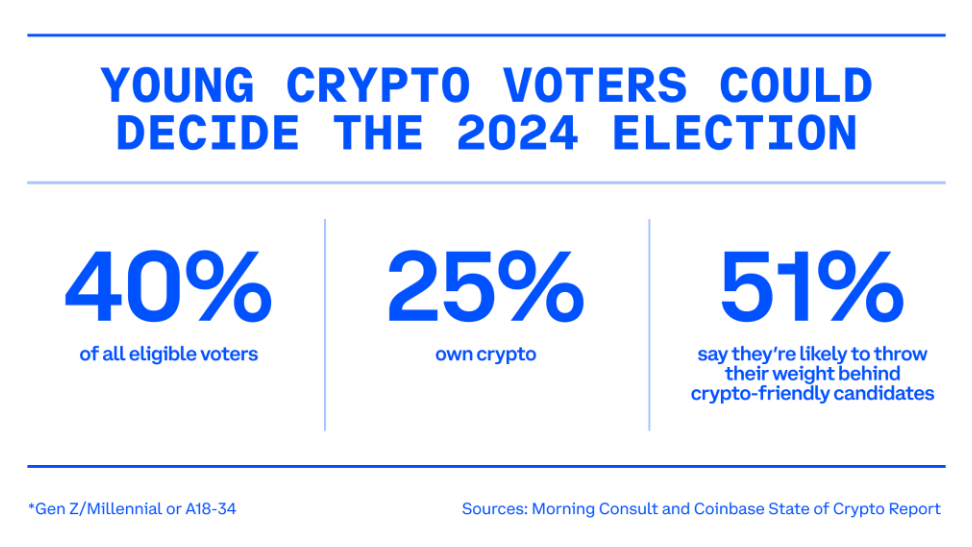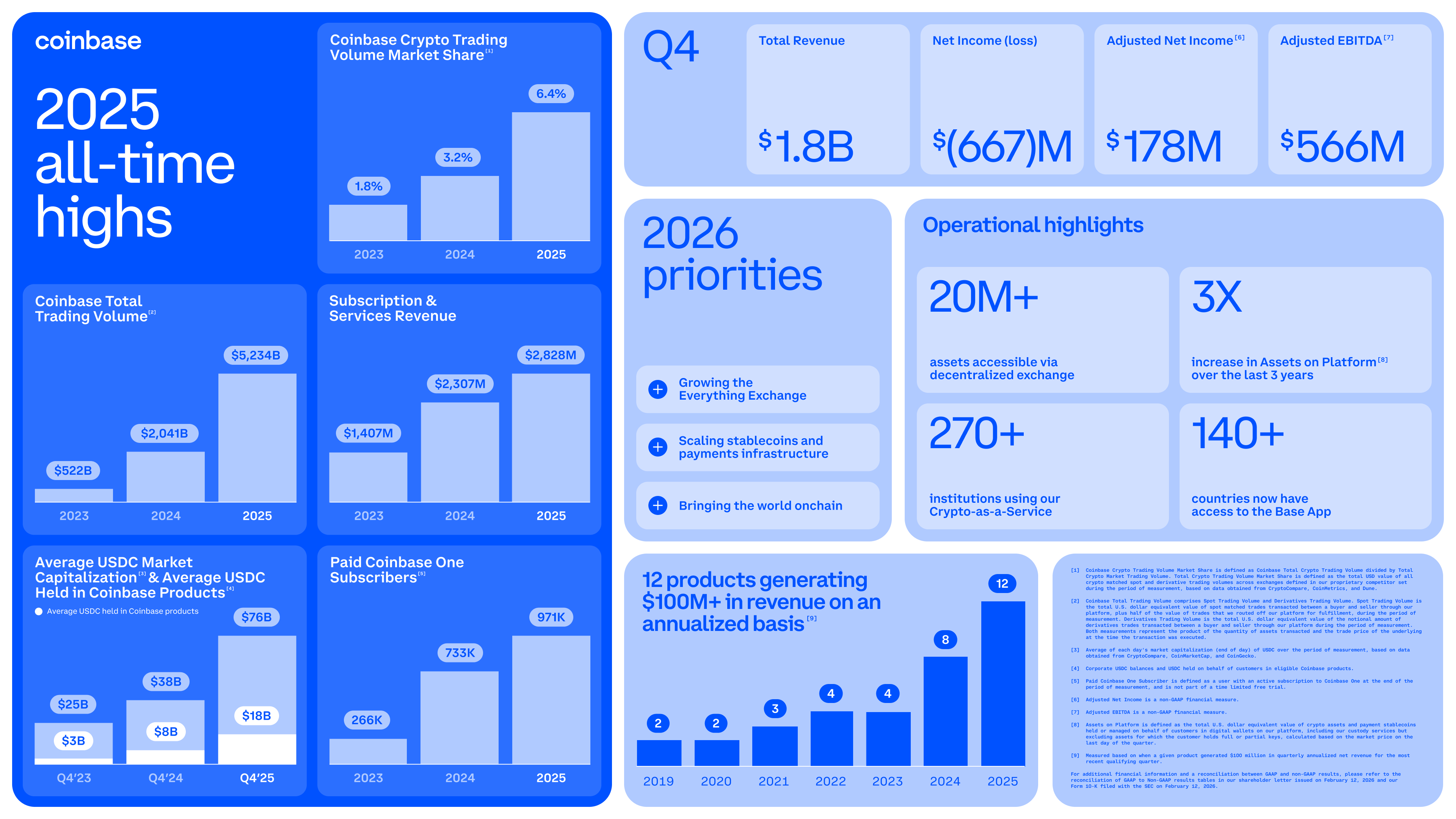Why the presidential election could be decided by young crypto voters
Tl;dr: Young voters made the difference in the 2020 U.S. elections and are expected to be a deciding factor again in 2024. Gen Z and Millennial voters make up 40% of all eligible voters, and will be the majority of the electorate by 2028 – and they disproportionately represent pro-crypto, pro-innovation voters who want to support candidates that will help improve and update the system. Any candidate that wants to win in 2024, especially those running in the battleground states that can make or break federal elections, must account for the young, pro-crypto constituency.

Only 9% of Americans say they are satisfied with the current financial system. And among younger Americans [1], just 7% report that the financial system works well for them. Young voters are fed up with an outdated system and are looking for change – and this belief is fostering an emerging, first-of-its-kind pro-crypto constituency that has elevated crypto as a key campaign issue in the 2024 election cycle.
Young voters are expected to come out in droves in the upcoming U.S. elections
Young Americans make up no small margin of voters. Gen Z and Millennial voters make up 40% of all eligible voters, will be the majority of the electorate by 2028, and have a proven track record of swaying elections at all levels of government. For example, in 2020, 55% of eligible voters under 30 made their voices heard at the ballot box, eleven percentage points higher than in 2016. This active constituency is likely to be a deciding factor again in 2024; 92% of registered voters under 35 say they are likely to vote in the November election [2].
Not only is this voting bloc sizable, they have a different worldview to the generations that came before. Just 19% of Millennials and 9% of Gen Z adults feel the American Dream is achievable [3]. They are actively looking for change. And part of that change is crypto. As younger generations become more pressured financially and more disillusioned by the current system, they’re also becoming more empowered by technology and emboldened by their influence to do something about it. As a result, younger generations own crypto in significantly greater numbers than older populations – with 25% of those aged 18-34 owning crypto compared to 14% of older Americans [4]. And as we can see by the growing number of pledged Stand with Crypto advocates – 1.33 million at the time of writing – they’re looking for candidates who match their drive for innovative new solutions to systemic problems. With fewer than 80 days to go until the 2024 elections, candidates on both sides of the aisle who wish to win this November must pay attention to the young, diverse, pro-crypto constituency that can make or break campaigns.

Young voters are making crypto a top-of-mind political issue – especially in battleground states
Contrary to popular opinion, crypto is a non-partisan issue: 41% of previous or current crypto owners under 35 in swing states identify as Democrats, 39% identify as Republicans, and 20% identify as independent or other [5]. And now, younger voters’ embrace of crypto has helped make crypto policy a key topic on the campaign trail this year. Nearly two in five (38%) say crypto and blockchain can increase economic opportunities for them in ways traditional finance can’t. Almost four in ten (38%) see crypto as the future of finance. And importantly, more than half (51%) of them are likely to throw their weight behind crypto-friendly candidates in 2024. Young voters can tip the scales for either party – and this is all the more critical in battleground states where a handful of ballots can mean the path to victory for either party.
In Georgia, for example, 51% of eligible voters under 30 cast ballots in 2020 compared to 37% in 2016. This was the biggest jump among the demographic in the South, and a major factor in President Biden’s narrow victory in the state in 2020. Since then, crypto has surged as an issue of interest, especially among younger voters, and Stand with Crypto advocates in Georgia now triple the vote differential that decided the Biden v. Trump outcome in 2020. With Georgia expected to be one of the most contested states in the country again this year, the pro-crypto, young voting demographic turnout will have a measurable impact on who wins the state.
Other battleground states follow the same pattern. The young voter surge was larger in Arizona than it was nationally in 2020 compared to 2016. And we know this surge comes with cries for change; 88% of previous and current crypto owners under 44 in Arizona think the financial system needs change, with 27% wanting a complete overhaul of the system [5]. In Michigan, youth voter turnout in 2020 jumped to 54% from 42% in 2016, helping President Biden secure another narrow victory in one of the most important electoral college states.
The future of the financial system is on the ballot this November
With this new generation of voters comes a new focus on digital asset innovation. A poll released in May of this year shows more than 20% of voters in several battleground states consider crypto to be a key issue in the upcoming U.S. elections. When you narrow to the newest generation of voters, 90% of Gen Z previous and current crypto owners in five key swing states think the financial system needs change [5], and 61% of previous and current crypto owners under 35 in five key swing states say they are enthusiastic about voting this year for candidates who support the crypto industry [5]. In these states, young crypto owners are tired of the rising costs and high fees associated with traditional financial services, and believe crypto and blockchain can help solve these problems.
As 2024 candidates up and down the ballot make their final push toward election day, these proof points should serve as an unmistakable call to action: young, pro-crypto voters are going to make their voices heard at the ballot box this year. Politicians who want their votes must address the future they are asking for. That future is financial and economic freedom. And crypto will be the path to that future.
Footnotes:
[1] For the purpose of this blog post, “younger Americans” and “younger voters” refer to the 18-40 age demographic unless otherwise noted
[2] Source: Registered Voters Research, Impact Research commissioned by Coinbase Inc., June 2024
[3] Source: Generational Research, Bovitz, Inc.commissioned by Coinbase Inc., July 2023
[4] Source: Morning Consult, April 2024
[5] Source: Source: Swing States research, Impact Research commissioned by Coinbase Inc., July 2024




